- Home
- Donald Hamilton
Night Walker Page 15
Night Walker Read online
Page 15
Then they were walking along the dock, side by side. Nothing moved, anywhere, except the Amberjack, ahead of them, rolling lazily in the light swell from the southwest. The cruiser strained briefly at the dock-lines and then swung in to bear hard against the fenders for a moment, with the live, captive motion of any vessel made fast to a dock. There seemed to be no one aboard, but the light continued to shine yellowly through the drawn blinds of the deckhouse. Young stopped at the edge of the dock, hesitated, and stepped down into the cockpit. He turned to give the girl a hand, but she already had jumped down lightly beside him. She was apparently not used to being helped aboard boats, but the gun in her hand made her clumsy, so that he had to grab at her to keep her from falling. For a moment she was in his arms, a small, compact, surprisingly feminine body. As he set her on her feet again, he was conscious of feeling vaguely responsible for the kid.
The two men must have been crouching outboard, along the seaward side of the deckhouse, hidden from the shore. There was no chance to resist; one took Young from behind, and the other, coming over the cabin top, dropped almost on top of Bonita Decker, striking the gun from her hand and wrenching the other weapon from her belt before she could make a move to reach for it. No word was spoken. The taller of the two, armed, gestured with his revolver toward the deckhouse door, and Young stepped forward and pulled the door open.
There were two people inside. Elizabeth Wilson had apparently been seated on the settee to starboard, but she was on her feet when the door opened. He was not really surprised to see her, but her appearance shocked him deeply. The pink slacks she was still wearing were streaked and smeared with dirt, as was the light sweater, which was also stretched out of shape in a peculiar manner, hanging loose about her, as if, trying to flee, she had been seized by the garment and hauled back unceremoniously by someone who had no respect whatsoever for either her clothing or her person. Her face was soiled and bruised, and there was a curious stiffness in the way she moved, as if she were old or very tired.
“David!” she gasped. “Oh, David, honey, I’m sorry, I couldn’t help it!”
He caught her as she came to him, but already his attention had gone beyond her to the man in the hat and the light topcoat standing by the controls at the forward end of the small cabin. He could not believe what he saw, even seeing the face thus, unmistakably recognizable in good light at close range.
Without letting the gun in his hand waver, the other took off his hat. It was almost as if he were removing a disguise; the action, as with most bald men, made him look years older.
“Welcome aboard, Lieutenant,” Dr. Henshaw said.
Chapter Eighteen
Elizabeth was saying, “Honey, I couldn’t help it! He made me tell him everything that had happened. He beat me and left me tied up for hours under some old house.”
The doctor spoke a low command. One of the men behind Young closed the door to the cockpit; and suddenly it seemed very quiet in the deckhouse as Elizabeth’s voice trailed away unheeded. There was only the distant murmur of traffic crossing the highway bridge a mile up the river, and the occasional creaking of a dock-line or a fender, and the splash of a wave against the boat’s planking. The red-haired girl was the first to stir.
“But — I don’t understand.” She looked accusingly at Young. “You said you’d seen — Where’s Larry?”
Young did not speak. He was still numbed by the shock of realizing the magnitude of the error he had made. He heard Dr. Henshaw laugh.
“Why, I’m Larry, Miss Decker,” the doctor said cheerfully. He sounded quite proud of himself. “I’m the only Larry the Lieutenant has ever met. He made the natural mistake of taking for granted that the man who introduced himself as Larry Wilson — who was driving Wilson’s car and had Wilson’s belongings in his possession — must necessarily be Larry Wilson. And when a man offers you a lift on the highway you don’t repay his kindness by staring at him, do you, Lieutenant? And modern dashboards don’t give a great deal of light.”
The red-haired girl looked from one to the other. “I’ll be damned if I’ll believe that!” she cried. “Why, he saw you in the hospital; you even came up to the house to treat him several times, didn’t you? You can’t tell me he didn’t recognize—”
The doctor said, “Lieutenant Young’s confusion is really quite understandable, Miss Decker. One night he is knocked over the head by a man he never really gets a good look at. This individual is firmly fixed in his mind as a dubious character named Wilson. Some days later, sick and in pain, he is introduced to a reputable physician named Henshaw, vouched for by the hospital authorities. Is it going to occur to him, in his weak and dazed condition, that these two men are one and the same person, particularly when all circumstances seem to indicate that the second man is twenty years older than the first?”
It was neat, Young had to admit to himself bitterly. It was just about like Henshaw said, except that Young had sensed something familiar about the man and his voice at the hospital and later at the Wilson home. If only he could have connected Henshaw with these vague thoughts at the time — but it was a little late for that now.
“But — but he claims Larry shot at him last night!” Bonita said. “He says he even saw him doing it! He says he saw him tonight, too!”
Henshaw said pompously, “Yes, that’s really a very interesting psychological phenomenon, Miss Decker. You see, as long as I maintained, shall we say, my aura of respectability — as long as I was just an old bald fogy of a general practitioner being, er, made a sucker of by the wife of one of my patients — it never occurred to the Lieutenant to think of me in any other terms. Therefore, when he caught a glimpse of me on the lawn as an armed, threatening, conspiratorial figure dressed in the coat and hat — particularly the hat — that ‘Larry Wilson’ had worn that first night, he did not recognize me as the respectable Dr. Henshaw, but simply as the man who had tried once before to kill him... Of course, this development was wholly unplanned. I was merely waiting outside the door to speak to Mrs. Wilson; and the Lieutenant’s appearance caught me by surprise. Having inadvertently attracted his attention, I shot out the flashlight in the simple hope that he wouldn’t recognize me at all. It never crossed my mind — I was surprised as anybody — almost as surprised as Mrs. Wilson, although I didn’t take refuge in hysterics — to learn that our young friend thought he had seen Larry Wilson alive. Naturally I wasn’t going to discourage the idea, and I prevailed upon Mrs. Wilson not to disillusion him. The Lieutenant’s mistake worked out nicely for me; and tonight I put on the same coat and hat — my own, incidentally, reserved for occasions when I do not wish to appear as old, bald, hatless, sloppy Dr. Henshaw — in order to deliberately trade on his illusion that Larry Wilson was at the bottom of all his troubles.”
Something about the choice of words seemed to strike the doctor as unfortunate; perhaps the idea of Larry Wilson being at the bottom of anything. He stopped talking.
Bonita Decker licked her lips. Her freckles were quite noticeable. “You say you were driving Larry’s car that night. Then — where was Larry?”
“Why,” Dr. Henshaw said, “he was where he has always been, since much earlier that evening, Miss Decker. He was out beyond the mouth of the channel, at the bottom of the Bay, wrapped in several fathoms of heavy chain, with a bullet through his head.”
The girl looked at him for a moment without moving. Her lips were a little parted. Her tongue came out to moisten them again; otherwise there was no sign that she understood what she had just been told. Then she made a convulsive little movement as if to whirl and flee, but the two men behind her blocked the narrow doorway completely and she checked the impulse before it had more than barely suggested itself in action. Suddenly the tenseness seemed to flow out of her; she sank down on the starboard settee and, after a moment, drew an arm across her face in a childish, ashamed gesture to wipe away the tears that she could not control.
There were footsteps on the dock. The man in the cockpit stepp
ed back to look and put his head back into the deckhouse to say, “Here they are, Doctor.”
A little excitement came into Henshaw’s eyes, but he merely nodded and said, “It’s about time. Keep an eye on these.”
He pushed his way out of the narrow, crowded cabin, and Young heard him climb to the dock, to be greeted by a man speaking in a low, guarded, yet somehow triumphant voice.
Young could not follow what was being said, and after a while he gave up trying. A little sniffing sound made him look at Bonita Decker, who glanced up at the same moment, defiantly, as if daring him to criticize, or even sympathize with, her grief. There was also a hint of contempt in the red-haired girl’s look; and he became aware that he was still holding Elizabeth Wilson, in an absent sort of way. It seemed odd that he should need to be reminded of this; Elizabeth was not the sort of girl whose presence in your arms you would expect to overlook.
Yet she was meaningless here, he discovered. She was not a factor in the situation; she added no weight to either side of the balance, she was not to be counted on, by anybody. It disturbed him that she had been hurt and was now frightened; he was vaguely offended at the discovery that her sweater was gritty to the touch; it bothered him that its strained condition made it quite obvious to anyone that she was naked beneath it. He did not like other people to see her this way, looking dirty and terrified and a little indecent; yet the instinct to help and protect her was no longer a powerful emotion.
It was not a matter of resentment. He did not even have to forgive the way she had let him down and lied to him and concealed things from him — the way she had betrayed him to Henshaw and Henshaw to him — there was nothing to forgive. People were what they were, and he was in no position to criticize anyone else’s weakness. She had never led him to expect a great measure of personal loyalty. Yet there was a kind of loyalty that everyone had a right to expect from everyone else who accepted the rights and privileges of a given society. He had almost betrayed that loyalty himself, so he still had no right to condemn her, but he knew now that he could not follow her across the line, not even to help her.
An unknown voice spoke with sudden clarity outside. “... no need to notify the Marbeth. Our people must be prepared for sacrifices, and she will make an excellent decoy; in fact, this is an improvement on the original plan. You should have no trouble in slipping down the Bay while they concentrate their attention on Elder Island. Proceed direct to the rendezvous, and scuttle the boat... This is the last coup, but the biggest one. The reward will be great, at your destination, Doctor. I envy you. Don’t forget to mention the others who made your success possible.”
Henshaw’s voice said smoothly, “To be able to make such a contribution is its own reward.”
“Of course, Doctor.”
“Naturally I will make certain that full credit is given to all.” The Amberjack rolled slightly, accepting the doctor’s weight. The two men in the doorway separated to admit him to the deckhouse. He spoke to them. “The courier will take you back to Washington.” They nodded and moved away. The boat’s motion told of their departure. Henshaw pointed the gun at Young. “Start her up, Lieutenant.”
“What?”
Henshaw gestured toward the controls. “Start the motor. Take us out of here. Don’t try any tricks; I’ll be standing right behind you.”
Something unpleasant happened inside Young at the thought of taking the wheel. He glanced at Elizabeth, who had seated herself to port; there was no help in her streaked and beaten face. He did not look at the other girl, not wanting her to see the fear in his eyes. He heard his own voice speaking with a kind of breathless protest: “But I don’t remember — It’s been years since I—”
Henshaw took a step forward. “I said, start it!”
Young drew a long breath, turned, and walked to the helmsman’s seat. It was, after all, nothing; it was not like taking an airplane off the ground; nothing could happen to you in a boat. You could run her on a mudbank; that was about the worst that could happen... He tested the wheel under his hand, checked to see that the clutch was disengaged, and turned the ignition key. When he pressed the button, the engine started up beneath the deckhouse floor. The illuminated dials told him there was gas in the tanks, pressure in the oil system, and that the battery was charging. With the engine idling, the tachometer barely registered a reading; he shifted the throttle, watched the needle swing up into the hundreds, and brought it down again... A ship had more stuff and bigger stuff, he thought, but it was all part of the same thing, something he had been fleeing for over six years. He felt the forty-foot cruiser roll gently beneath him with that unmistakable, unforgettable motion that told you you no longer belonged to the land. The others must have thrown off the lines before they left.
“Ready forward?” Young asked softly.
Henshaw heard him. “Ready forward.”
“Ready aft?”
“Ready aft. Take her away, Lieutenant. Starboard your helm as soon as you’re clear.”
It took him a moment to interpret the instructions; in the Navy the order would have been given as “left rudder.” Then the clutch was engaged and the boat was moving forward and, as the stern cleared the dock, swinging obediently under his hand. He heard his own voice:
“Course?”
“Just follow the buoys out. Turn out the cabin lights — the second switch from the top. We’ll dispense with the running lights tonight. You can take her up to sixteen hundred r.p.m. as soon as we hit the channel.”
“Sixteen hundred.”
“Steady as you go now.”
“Steady, aye-aye.”
He had almost forgotten where he was and who was with him. It did not matter for the moment that a gun was aimed at his back. He was doing something he had once done well and loved doing; and it was coming back to him as if he had never been away. He felt a quick sense of triumph; there had never been anything to be afraid of, he told himself; his fears had been as imaginary as the Lawrence Wilson by whom he had thought himself pursued and persecuted — a man already a week dead and buried! Then two things happened at once; as they came out beyond the shelter of the river mouth the boat rose abruptly to a cross swell, and at the same time the cold engine hesitated and coughed. The faint jar coupled with the very minor explosion seemed to take him back over the years to a night when he had felt a great ship pause, and watched the flight deck go up in a towering column of flame, before the blast swept him off his feet....
After a while he found himself in the cockpit being very sick in the cruiser’s wake. He straightened up and wiped his mouth with his handkerchief. He felt weak and shaken, bitterly ashamed and cruelly defeated. Henshaw was standing, with his gun, in the deckhouse doorway, and Elizabeth was steering. The doctor gestured with the gun, and Young came back inside. He sat down heavily. Presently someone spoke beside him:
“Dramamine’s supposed to cure it.”
He did not look at Bonita Decker, but merely shook his head. Henshaw, leaning in the doorway, laughed.
“The Lieutenant isn’t seasick. He’s just frightened. He’s allergic to boats, Miss Decker — a rather peculiar complaint for a Naval officer, don’t you think?” The girl did not speak, and presently the doctor went on: “Suppose you take the wheel, Miss Decker. Mr. Young might have another attack, and Elizabeth seems to be steering us all over the Bay.”
Chapter Nineteen
He could feel the steady vibration of the engine through his body; one of the deckhouse windows rattled softly and constantly behind him. The throbbing note of the exhaust mingled with the hissing rush of water past the boat’s hull; he was aware of all these sounds, and he could feel himself tighten up painfully whenever there was a minute change in any one of them.
He thought bitterly that he ought to be grateful; circumstances had at least saved him from making a fool of himself on shipboard. The only thing to be done with a Naval officer in his condition, he reflected, was to take the poor guy out and shoot him; which, he suspected,
was precisely what Henshaw had in mind. Somehow this idea did not terrify him. You could face these simple, straightforward fears; what the hell, there was nothing wrong in being scared of getting killed, as such. It was the complicated terrors that grow out of the kinks in your own mind, set off by things that bothered no one else, that made you feel like crawling into a hole and blowing your brains out. When you lost your lunch when an engine backfired slightly, or found yourself cringing at the smell of gasoline....
He saw the can, then. It had been placed handy, right inside the deckhouse door, a one-gallon can painted red so that even in the dim light no one could mistake its contents. There was not the slightest doubt in Young’s mind why it had been brought aboard. Proceed to the rendezvous and scuttle the boat, the unknown man had said; and Henshaw had already showed that he was an individual who liked to sprinkle gasoline over things and watch them burn. Young found himself edging his way along the seat away from the door and the red-painted can that seemed to glow faintly in the darkness.
“David!”
Elizabeth was beside him, gripping his arm. He looked at her blankly.
“David, honey, what’s he going to do to us?” she demanded.
“Ask him,” Young said.
She glanced fearfully toward Henshaw and, after a moment, released Young’s arm. “Bob,” she said. “Bob, honey, you know I didn’t mean — I declare, I told you everything you wanted to know. Why, if I hadn’t done like I did — Why, the man said it was an improvement on the original plan. I wasn’t really going to run away; I was going to come and tell you—”
Henshaw did not move. Young said, “Elizabeth, stop it.”

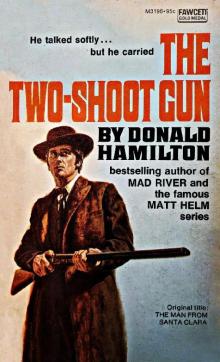 The Two-Shoot Gun
The Two-Shoot Gun Mad River
Mad River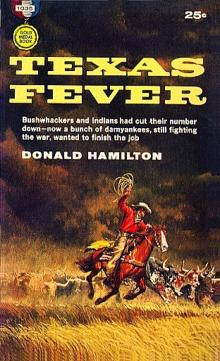 Texas Fever
Texas Fever Ambush at Blanco Canyon
Ambush at Blanco Canyon The Big Country
The Big Country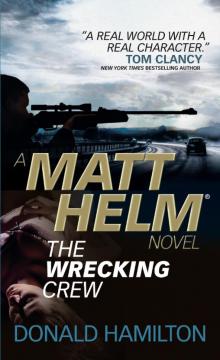 The Wrecking Crew
The Wrecking Crew The Devastators mh-9
The Devastators mh-9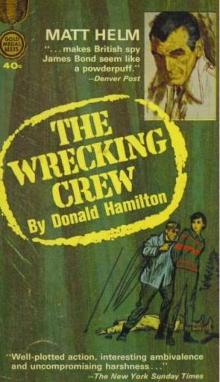 The Wrecking Crew mh-2
The Wrecking Crew mh-2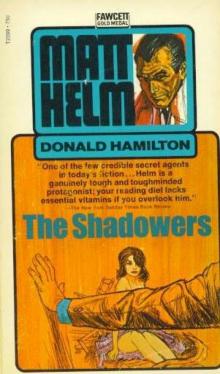 The Shadowers mh-7
The Shadowers mh-7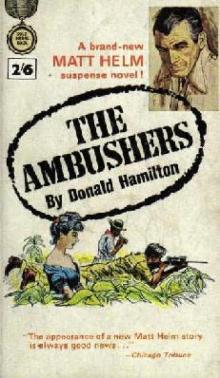 The Ambushers mh-6
The Ambushers mh-6 The Betrayers
The Betrayers The Terrorizers
The Terrorizers The Poisoners
The Poisoners The Devastators
The Devastators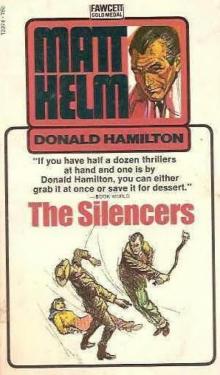 The Silencers mh-5
The Silencers mh-5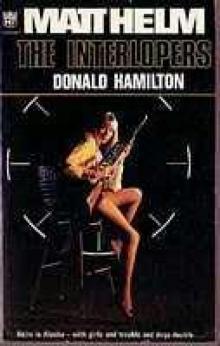 The Interlopers mh-12
The Interlopers mh-12 The Shadowers
The Shadowers The Annihilators
The Annihilators The Vanishers
The Vanishers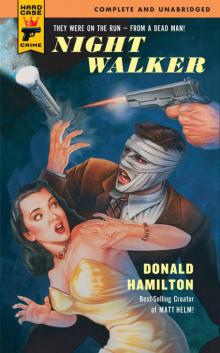 Night Walker
Night Walker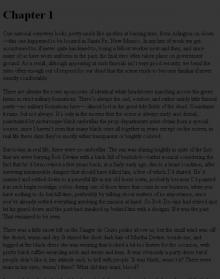 The Revengers
The Revengers The Frighteners
The Frighteners The Infiltrators
The Infiltrators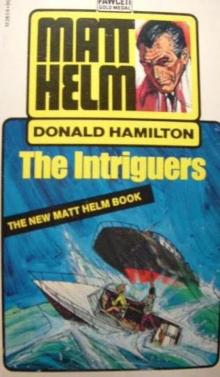 The Intriguers mh-14
The Intriguers mh-14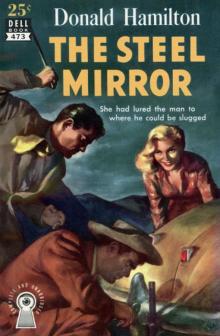 The Steel Mirror
The Steel Mirror The Menacers
The Menacers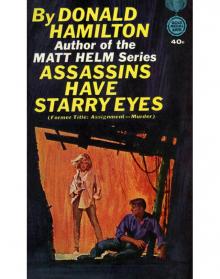 Assassins Have Starry Eyes
Assassins Have Starry Eyes Death of a Citizen
Death of a Citizen Matt Helm--The Interlopers
Matt Helm--The Interlopers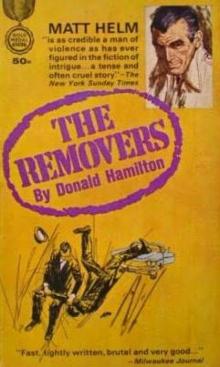 The Removers mh-3
The Removers mh-3 The Demolishers
The Demolishers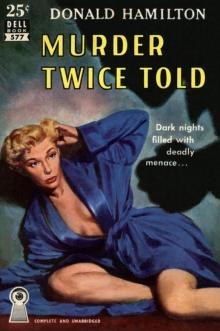 Murder Twice Told
Murder Twice Told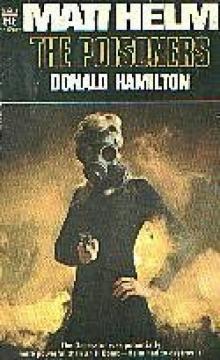 The Poisoners mh-13
The Poisoners mh-13 The Ambushers
The Ambushers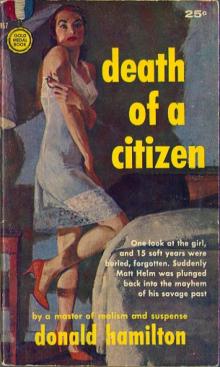 Death of a Citizen mh-1
Death of a Citizen mh-1 The Silencers
The Silencers The Removers
The Removers The Intimidators
The Intimidators The Damagers
The Damagers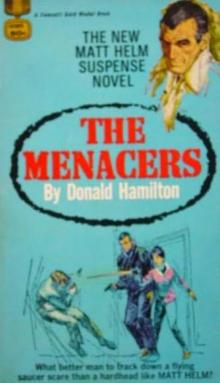 The Menacers mh-11
The Menacers mh-11 The Retaliators
The Retaliators Murderers' Row
Murderers' Row The Ravagers
The Ravagers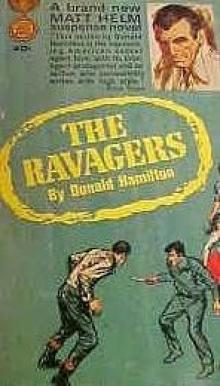 The Ravagers mh-8
The Ravagers mh-8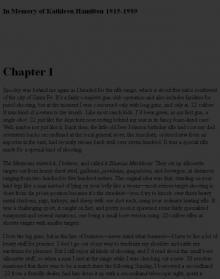 The Threateners
The Threateners The Betrayers mh-10
The Betrayers mh-10